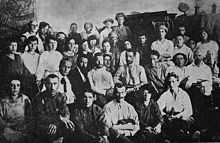Ghiță Moscu
Ghiță Moscu (born Gelbert or Gelber Moscovici, also known as Alexandru Bădulescu, Russian: Александр Саимович Бадулеску; 1889 – November 4, 1937) was a Romanian socialist and communist activist, one of the early leaders of the Romanian Communist Party and its permanent delegate to the Third International.
Biography

He was born in a Jewish family in Băiceni, near Iași, in north-eastern Romania. He was the son of a veteran of the war that confirmed Romania's independence, and brother of Ilie Moscovici, himself a socialist, one of the leaders of the reformist Romanian Social Democratic Party (1927-1940). A student of the Iaşi superior school of commerce until 1910, he joined the local socialist România Muncitoare circle in 1906.[1] During the years before the First World War, Moscu was engaged in the pacifist anti-war movement, writing articles in the socialist youth press.[2] He represented the socialists of Paşcani at the 1910 Congress reorganizing the Social Democratic Party of Romania (1910-1916). In 1915, at the fourth Congress, where he participated as a delegate for Bucharest, Moscu was elected in the party's control commission. In August 1915 he was also elected in the Committee of the newly created commercial employees’ trade union.
During the war Moscu gradually moved toward communism, being engaged with the socialist "maximalist" group that chose to continue its activity clandestinely in German-occupied Romania. In 1918 he was arrested in Bucharest by the German military administration and sentenced to four and a half years confinement in Jilava for spreading a manifesto saluting the Russian Revolution.[1] In December 1918, after the reinstalled Romanian authorities opened fire on demonstrating workers during a general strike, he was arrested again and jailed for "attack on public security". The following year he represented the youth wing of the Socialist Party in the Berlin Congress that created the Communist Youth International, signing its founding manifesto in the name of the Working Youth of Romania.[3] In 1921 he left Romania for Soviet Russia with his wife Clara (also known under the pseudonym Ana Bădulescu).[2] In 1921 Moscu, who had by the time adopted the name Bădulescu, headed the Romanian delegation to the Third Congress of the Communist International (Comintern), being elected a member of its Executive Committee (ECCI), as the sole Romanian representative. At the same Congress his wife was elected in the International Communist Women's Secretariat. Afterwards, the couple settled in Moscow, and was active in the Comintern press. Beginning with 1923, Moscu was deputy rapporteur of the ECCI for the Balkan countries, and in 1927 he was appointed a member in the Balkan Secretariat of the Comintern. In 1924 he was admitted in the Bolshevik Party, and later that year participated in Romanian Communist Party's third congress, that took place in Vienna.[2] During most of the interwar, Moscu remained the RCP permanent delegate to the Comintern.[4]
In the late 1920s, Moscu was entrusted with a high position in the Moldavian Autonomous Soviet Socialist Republic. In the final years of his life he worked as a consulting editor for the Co-operative Publishing Society of Foreign Workers in the USSR. Expelled from the Communist Party in 1935, he was eventually killed in 1937, during the Great Purge, accused of creating a spy ring inside the ECCI. He was later rehabilitated, first in the USSR and then in Romania, during the de-stalinization campaigns in the Eastern Bloc.[2][5]
Footnotes
- ↑ 1.0 1.1 Stelian Tănase, Clienţii lu' tanti Varvara: istorii clandestine, Humanitas, 2005, p. 290
- ↑ 2.0 2.1 2.2 2.3 Branko M. Lazić,Milorad M. Drachkovitch, Biographical dictionary of the Comintern, Hoover Press, 1986, p. 326
- ↑ C. Bărbulescu et. al., File din istoria UTC, Editura Politică, 1971, p.59
- ↑ Vladimir Tismăneanu, Stalinism for all seasons: a political history of Romanian communism, University of California Press, 2003, p.274
- ↑ The Prague Spring and the Warsaw Pact Invasion of Czechoslovakia, 1968, M. Mark Stolarik, pg.240